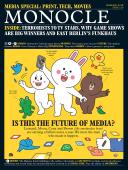
Issue 110
Media special. Terrorists to TV stars, why game shows are big winners and East Berlin’s Funkhaus.
In This Issue
Oops! No content was found.
Looks like we no longer have content for the page you're on. Perhaps try a search?
Return Home
Daily inbox intelligence from Monocle

Media special. Terrorists to TV stars, why game shows are big winners and East Berlin’s Funkhaus.
Looks like we no longer have content for the page you're on. Perhaps try a search?
Return Home